Home » English Speaking (Page 2)
Category Archives: English Speaking
Short English Sentences(smart english)
We can speak these short English Sentences to impress others during conversation.
Watch Videos on Short English Sentences to make the concept more clear.
- Mai tum se shart lagata hu.
- I bet you.
- Chidana band kro.
- Stop teasing.
- Tum manhoos ho.
- You are jinx.
- Thande dimaag se socho.
- Think calmly.
- Kanafusi mat kro.
- Don’t whisper.
- Use mnao.
- Convince him.
- Aank mat maro.
- Don’t wink.
- Nazar na lge.
- Touch wood.
- Mera sir mat khao.
- Don’t nag me.
- Tang mat adao.
- Don’t interrupt.
- Maan jao.
- Now, give in.
- Use shod do.
- Leave him.
- Jid mat kro.
- Don’t insist.
- Use andr bhejo.
- Sent him in.
- Mujhe jane do.
- Let me go.
- Chillao mat.
- Don’t shout.
- Mai bhi.
- Me too.
- Or kya ?
- What else?
- Kal milenge?
- See you tomorrow.
- Yha thehro.
- Wait here.
- Koi baat nhi .
- Never mind.
- Idhar dekho.
- Look here.
- Ye lo.
- Take it.
- Upper jao.
- Go up.
- Neeche jao.
- Go down.
- Dheere chlo.
- Go slowly.
- Utar jao.
- Get off.
- Savdhan rho.
- Be careful.
- Magarmachh ke aansoo.
- Crocodile’s tear
- Ye kafi hai.
- That’s enough.
- Mujhe dhmki mat do.
- Don’t insist.
- Sharmao mat.
- Don’t feel shy.
- Hitchkichao mat.
- Don’t hesitate.
- Apna gussa thook do.
- Spit out your anger.
- Meri kasam khao.
- Swear by me.
- Bhagwan jane
- God knows.
- Mujhe jane do.
- Let me go.
- Der mat kro.
- Don’t delay.
- Yha kooda mat fenko.
- Don’t litter here.
- Jyada baho mat khao.
- Don’t act so pricey.
- Jaldi khatam kro.
- Finish soon.
- Gussa mat kro.
- Don’t get angry.
- Yeh hota hai.
- It happens.
- Ghabrao mat.
- Don’t panic.
- Durvavhar mat kro.
- Don’t misbehave.
- Veh mera hai.
- That’s mine.
- Bilkul nhi.
- Not at all.
- I see
- Mai smajh gya.
- I am single.
- Mai avivahit hu.
- I think so.
- Mai esa sochta hu.
- I quit.
- Mai shodta hu.
- I am lost.
- Mai kho gya hu.
- I am home.
- Mai ghar par hu.
- I promise.
- Mai vada karta hu.
- I decline.
- Mai mna karta hu.
- Time is up.
- Smay smapt.
- Let go .
- Jane do.
- So long .
- Itna smay.
- Have fun.
- Mje kro.
- So do I .
- Mai bhi esa hi kru.
- How much ?
- Kitna?
- How many ?
- Kitne?
- After you.
- Aapke baad.
- You first.
- Pehle aap.
- My treat .
- Meri dawat.
- Good luck.
- Saubhagya .
- Follow me.
- Mere peechhe aao.
- Forget it.
- Rehne do.
- Watch out .
- Dhyan se.
- Keep in touch.
- Milte rehna.
- What’s new?
- Nya kya hai?
- Is it yours?
- Kya ye aapka hai?
- He is gone .
- Veh chla gya.
- That’s neat.
- Kafi achha hai.
- Control yourself.
- Saym rakhe.
- Sounds great.
- Achha lagta hai.
- Are you there?
- Tum vha ho?
- Congratulation.
- Vdhai ho.
- Do it right .
- Shi se kro.
- I am bored.
- Mai ubh gya hu.
- That happens.
- Esa hota hai.
- Slow down.
- Dheeme chlo.
- Relax .
- Aaram se.
- Don’t wink.
- Aank mat maro.
- Serve the food.
- Khana lga do.
- Keep mum.
- Chup rho.
- See him off.
- Usse vida kro.
- Aap pari ki trah lagti hu.
- You look like angel.
- Tum behad khubsurat lagti ho.
- You look stunning .
- You caste a spell on me.
- Tum mujh par jadu kar deti ho.
- Your face is dazzling like a moon.
- Tumhara chehra chaand ki trah chamk rha hai.
Digraph ph and gh
Digraph consists of two consonants that are blended to make one sound. Digraph ph and gh has the sound of ‘f’ .
Watch video for better understanding
ph = f
gh = f
here are some examples of digraph ph and gh
| Words with diagraph ‘ph’ | ||
| Autograph | Microphone | Phone |
| Cellophane | Nephew | Phonics |
| Diagraph | Orphan | Geography |
| Dolphin | Phantom | Alphabet |
| Elephant | Pharmacist | Photographer |
| Graph | Pheasant | Sphere |
| Words with diagraph ‘gh’ |
| Laugh |
| Laughter |
| Rough |
| Tough |
| Cough |
| Trough |
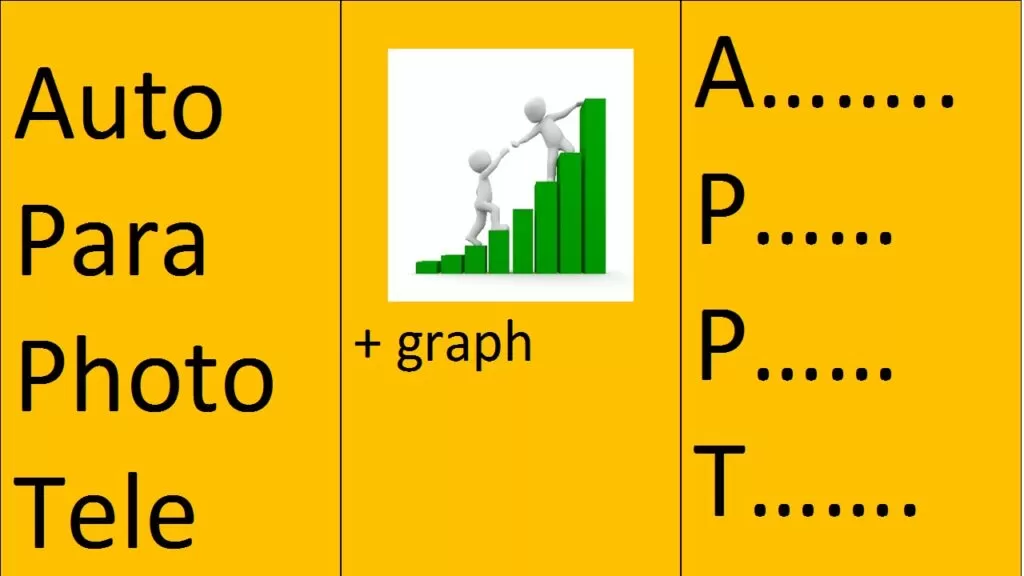
Advanced Phonics -air/are/ear – Word List
Advanced Phonics -air/are/ear have same phonic sound as given in the examples below. Such type of words are also known as homophones . A homophone is a word that is pronounced the same as another word but differs in meaning. A homophone may also differ in spelling.
Watch video for help:
| air | are | ear |
| Fair | Bare,dare | bear |
| Lair | Hare , pare | pear |
| Pair | Rare , flare | swear |
| Chair | Scare , stare | hear |
| Fair | Care , fare | near |
| Stair | Mare , bare | underwear |
| hair | Glare , share | wear |
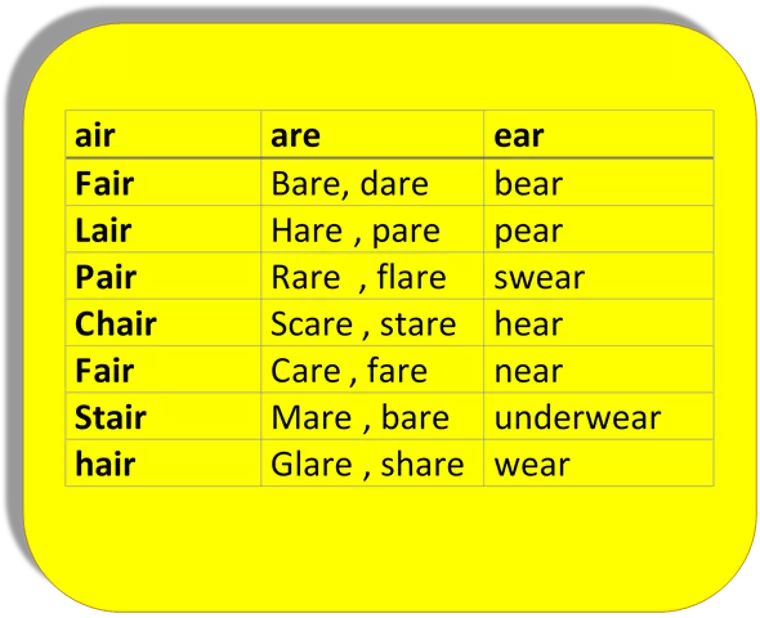
Magic E Rule in English-Long A
Magic E rule in English-Long A in English states that when the letter “e’ sits at the end of the word , it is usually silent and the ‘magical E ‘ tells the first vowel to say its name or long sound. For e.g: Long A = a_e
Watch video for help:
Long U = u_e
Here are some examples of Long A:
| Long A | Word form |
| ace | -ace |
| face | -ace |
| Lace | -ace |
| Mace | -ace |
| Pace | -ace |
| Race | -ace |
| Brace | -ace |
| Grace | -ace |
| Place | -ace |
| Trace | -ace |
| Bade | -ade |
| Fade | -ade |
| Jade | -ade |
| made | -ade |
| Wade | -ade |
| Blade | -ade |
| glade | -ade |
| grade | -ade |
| shade | -ade |
| age | -age |
| cage | -age |
| gage | -age |
| page | -age |
| rage | -age |
| sage | -age |
| wage | -age |
| stage | -age |
| Bake | -ake |
| Cake | -ake |
| Fake | -ake |
| Jake | -ake |
| Lake | -ake |
| Make | -ake |
| Quake | -ake |
| rake | -ake |
| Gape | -ape |
| Grape | -ape |
| Nape | -ape |
| Drape | -ape |
| Taste | -ape |
| Waste | -ape |
| Paste | -ape |
The vowel team rules states when to vowels go walking and first does talking and second vowel is silent.
Maid
Brain
Paint
Aim
Bait
Braid
Brain Chain
Braise Detail
Phonics sounds (with worksheet)
Phonics sounds of words having long u (you) sound : ue , ew, u_e
| Cue | Few | Cube |
| Clue | Dew | Mule |
| Value | New | Fuse |
| Fuel | Strew | Tune |
| Argue | News | Tube |
| Rescue | News | Duke |
| Barbecue | Threw | Rude |
| Glue | grew | |
| Blue |
Fill the Star with “RED” colour having sound of “ew”
Fill the Star with “PINK” colour having sound of “ue”
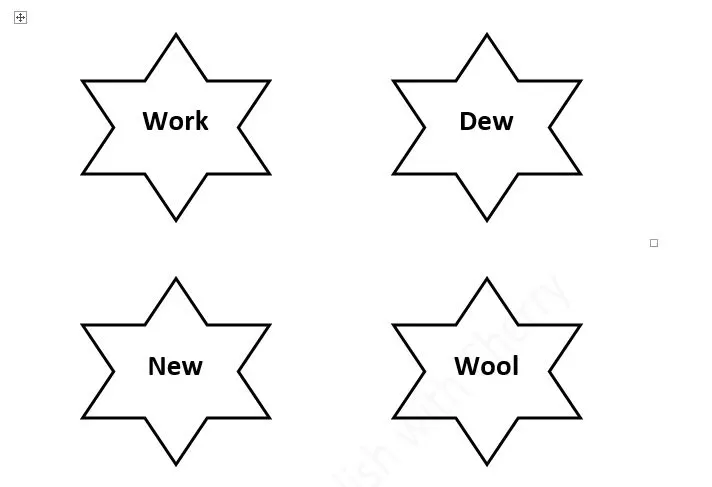
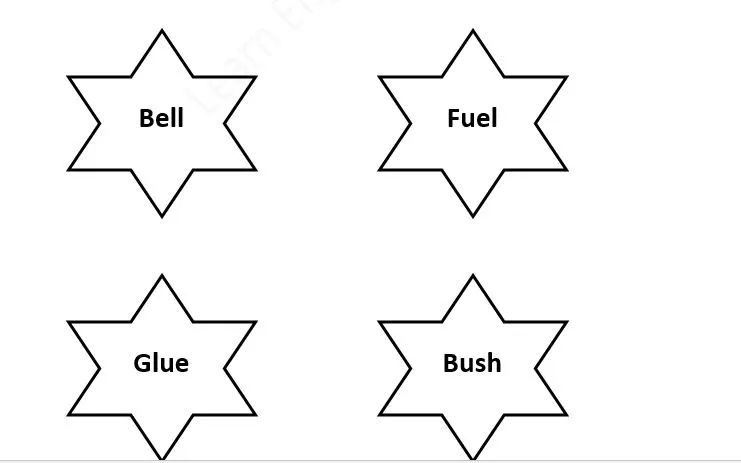
Words with phonic sounds long i : ….igh , ….ight
Write the opposite words
| Day | ________________ |
| Low | ________________ |
| Loose | ________________ |
| Left | ________________ |
| Dim | ________________ |
| Dark | ________________ |
How to Use ‘to be + V3’ in English grammar
आज के इंग्लिश लेसन में आप सीखेंगे Use ‘to be + V3’ in इंग्लिश ग्रामर
use ‘to be + V3’ – कुछ होने को है , कोई काम बाकी है , होने को था ( इसका use हम तब करते है जब कोई काम अभी पूरा नही हुआ होता अभी होने वाला है )
Watch video for help:
Is/am/are + to be + v3 ( काम किया जाना है )
Has / have + to be + v3 (compulsion) ( काम किया जाना है ) for compulsory action (हर ऱोज करना है या करना पड़ता है )
Was / were + to be + v3 ( काम किया जाना था )
Had + to be + v3( compulsion) ( काम किया जाना था ) compulsory action
इसका काफी use हम देखते है जब newspaper पढ़ते है या news headlines पढ़ते है | और हमे subject का पता नही होता तो हम passive form use करते है |
let’s discuss some examples:
- These clothes are to be washed.
- Ye kapde dhoye jane hai.
- Children are to be sent to school.
- Bacho ko school bheja jana hai.
- Guitar is to be played.
- Guitar bjaya jana hai.
- Window is to be installed.
- Window intall kri jani hai.
- Decision is to be made.
- Faisla abhi liya jana hai.
- Case is to be decided.
- Case ka faisla abhi liya jana hai.
- I am to be there by 11 pm.
- Mujhe 11 bje vha hona hai.
Was / were + to be + v3 ( काम किया जाना था )
- This room was to be cleaned yesterday.
- Kal karma saaf kiya jana tha.
- Medicine was to be kept cold.
- Dwai ko thanda rakhan jana tha.
- He was to be asked.
- Us se poochha jana tha.
- Kids were to be praised for their hard work.
- Bacho ki mehnat ke liye unki prashansha ki jani thi .
- Hme btaya jana tha.
- We were to be told.
- Rooms need to be cleaned.
- Kamre ko saaf kiye jane ki jroorat hai.
- Kapde dhoye jane the.
- The clothes had to be washed.
- Khana abhi khana hai.
- Lunch is to be taken yet.
Watch the video to know more about the use ‘to be + v3’ in english.
- Gift abhi khole jane hai.
- Gifts are to be opened yet.
- Ladki abhi dekhni hai.
- Girl is to be found yet.
- Mobile abhi khridna tha.
- Mobile was to be purchased yet.
- Ticket abhi leni hai.
- Ticket has to be taken / purchased yet.
- Khana abhi pkaya jana hai .
- Food is to be cooked yet.
- He needs to be told his duty.
- Usko uski duty btaye jane ki jroorat hai.
- It needs to be done .
- Isko kiye jane ki jroorat.
- Dusting needs to be done.
- Dusting kiye jane ki jroorat hai.
English Speaking Practice for beginners by using -Let
In today’s lesson I have shared English sentences which can be used for English Speaking Practice for beginners .I tried to explained the concept of let for daily use English.
- Letme in.
- Mujhe andr aane do.
Let go : Janne do/ chhod do
- Let go ofmy hand.
- Mera hath chhod do.
- Helet go ofthe rope.
- Usne rasi chhod di.
- You need tolet go ofthe past.
- Beeti baton ko bhulla do.
- Letme buy you another one
- Mujhe tumhare liye ek or lene do.
- Letme google that for you.
- Mujhe ye tumhare liye google pe dhoondne do.
- Letme put off this decision
- Mujhe ye faisla radd karne do.
- Letme show you an example.
- Mujhe ek udhahran dene do.
- Letme take a quick shower.
- Mujhe jaldi se nhane do.
- Let me take you out.
- Apko bahar lijane ki ijajat hai.
- Let‘s call a spade a spade.
- Aao saaf saaf baat karte hai.
- Let‘s eat out this evening.
- Aaj sham bahr khane chalte hai.
- Let‘s get back to work.
- Aao kaam par bapis chalte hai.
- Let‘s give it one more try.
- Isme ek or koshish karte hai.
- dhoop ke ander aane ke liye parde khol do.
- Pull aside the curtains to let the sunshine in.
- Let‘s discuss the matter later.
- Iss vishey ko baad me vichaar krenge.
- Kisi ko 6 baje tak class mein nahi aane dena.
- Don’t let anyone into the class until 6 o’clock.
- Kisi ko mat batana ki tum mujhe jante ho.
- Don’t let on anyone that you know me.
- Akhir unhone mujhe apni yojna bata hi dee.
- They finally let me in on their plans.
- Kyunki yeh pehli baar tha, isliye maine tumhein keval chetavni dekar chhor diya.
- Because it was the first time, I let you off with a warning only.
Diwali wishes :Other ways to say ‘Happy Diwali’
Video help for diwali wishes:
More diwali wishes quote are here for you:
- This Diwali, may Goddess Lakshmi remove all the negativities from your life. May you be showered with happiness, good health, wealth and bounty?
- May Maa Lakshmi shower you with her choicest blessings and may you get rid of all your sorrows and agony this Diwali.
- Aapke jeevan mein dhan ki varsha ho
- Sukh evam samruddhi ka vaas ho
- Swasth swaasth, harsh aur ullas ho
- Aur Maa Lakshmi Ka Aashirwad ho
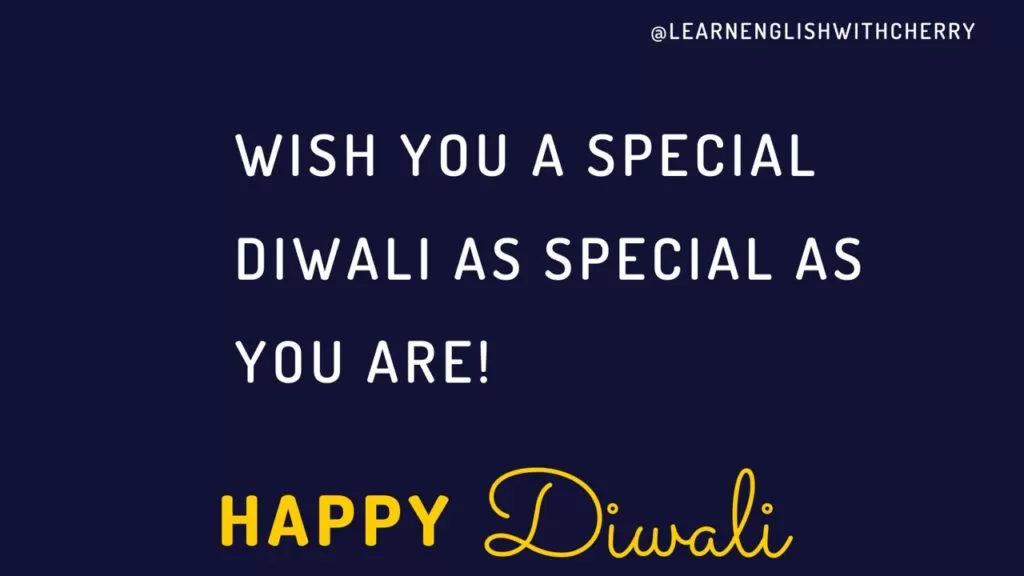
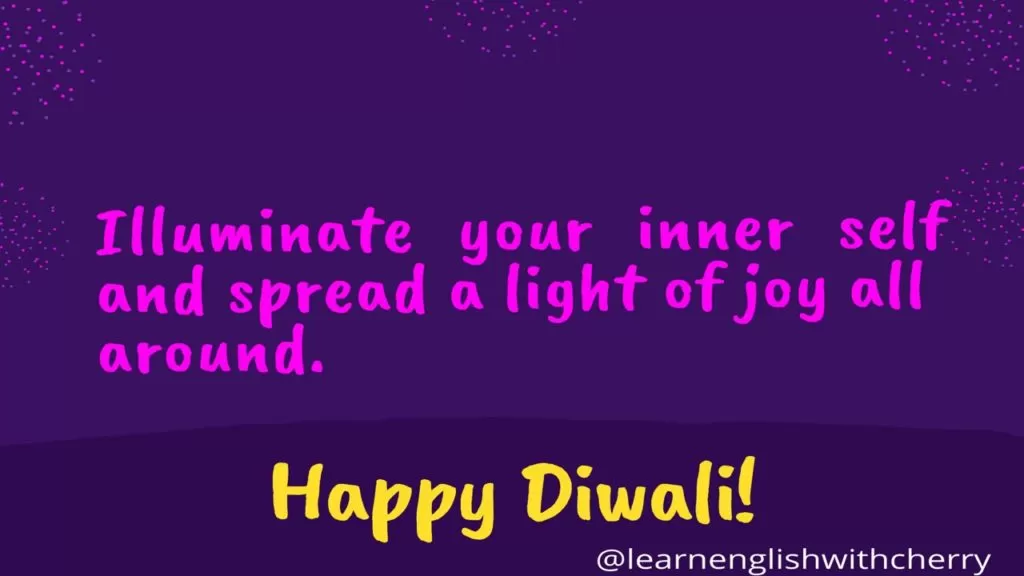
- Shine like sparkles, glow like candles and burn all the negativity like crackles. Wish you all a very lovely & cheerful Diwali!
- Life with you is like Diwali, therefore lets promise to be together like that forever. Wish you a really ‘Happy Diwali’
- Happy Diwali everyone. Have fun!
- Wishing you all a very happy and safe Diwali. Stay safe and be responsible and have a blast!
- Wish you a special Diwali as special you are!
- Hope this festival will lighten up your life.

- With a hope you attain every success with every light that is lit on this day. Happy Diwali
- Illuminate your inner self and spread a light of joy all around.
- May this Diwali comes with brightness and give you great memories which stays forever with you.
- Doubt is like darkness, Trust is like light, There is no way to destroy light by throwing darkness in to it. So come together and enjoy the festival of lights.
- Sun glows for a day; candle for an hour; matchstick for a minute; but a wish glows forever. Here is my wish for a glowing Diwali and glowing life!
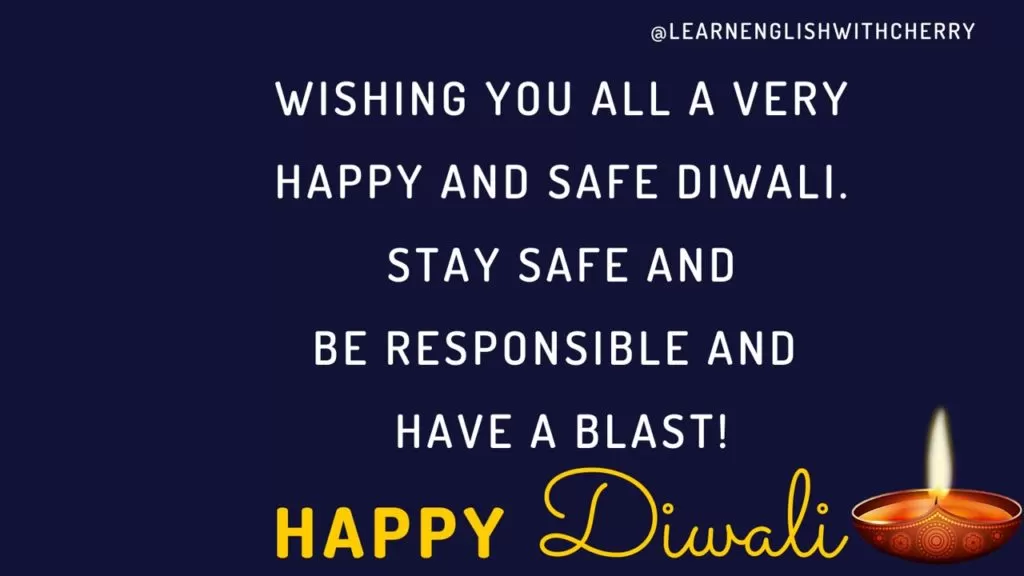
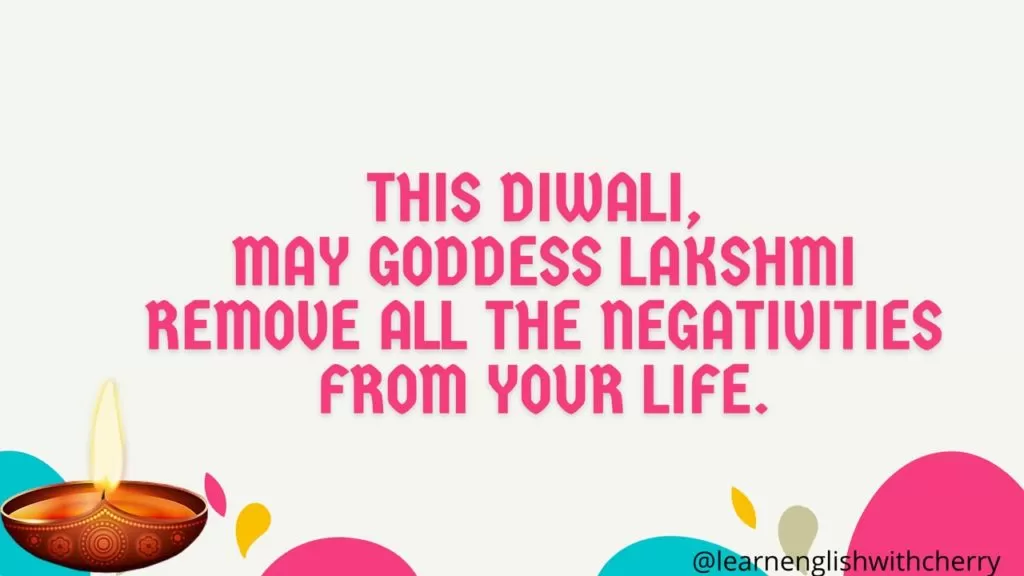
English conversation with kids
I have shared daily use English Sentences for English conversation with kids which can be used for English speaking practice with kids.
Learn more through this video on English conversation with kids:
Mom: बेटा, तुमने अपना सारा काम कर लिया?
(beta, tumne apna sara kaam kar liya)
Dear, have you completed all your work?
(डिअर, हैव यू कम्प्लीटिड आल युअर वर्क)
Kid : हाँ मैंने कर लिया है। – सब हो गया।
(haan maine kar liya, – sab ho gya)
Yes, Mom, I have done. – All caught up , Mom.
(येस, मोम आई हैव डन – आल काट अप मोम)
M: पक्का ?
(pakka)
Are you sure?
(आर यू श्योर)
K: हाँ, मम्मी।
(haan mummy)
Yes, Mom.
(येस, मोम)
K: नहीं मम्मी, एक बचा है ।
(nahin mummy, ek bacha hai)
No, Mom, Only one is left.
(नो, मोम, ओनली वन इज़ लेफ्ट)
M: कौनसा बचा है?
(kaunsa bacha hai ?)
Which one is left or incomplete?
(विच वन इज़ लेफ्ट ओर इनकम्प्लीट ?)
K: अंग्रेज़ी का, मम्मी।
(angrezi ka, mummy)
English, Mom.
(इंग्लिश, मोम)
K: मम्मी, मेरी बात सुनो।
(mummy, meri baat suno)
Mom, please listen to me.
(मोम, प्लीज़ लिसन टू मी)
M: बोलो!
(bolo !)
Speak up!
(स्पीक अप)
K: मम्मी ये कर दो।
(mummy ye kar do)
Mom, Please do this.
(मोम, प्लीज़ डू दिस)
M: अभी मैं व्यस्त हूँ।
(abhi main vyast hu)
I am occupied yet.
(आई एम् ओकूपाईड येट)
M: मैं बाद में कर दूँगी।
(mai baad mein kar dungi)
I will do it later on.
(आई विल डू इट लेटर ओन)
M: ये तुम खुद कर सकते हो।
(ye tum khud kar sakte ho)
You can do it yourself.
(यू कैन डू इट युअरसेल्फ)
M: मैं तुम्हारी शिकायतों से तंग आ चुकी हूँ।
(main tumhari shikayton se tang aa chuki hu)
I am sick and tired of your complaints.
(आई एम् सिक एंड टायर्ड ऑफ़ युअर कम्प्लेंट्स)
K: आप हमेश ऐसे ही कहते हो।
(aap hamesha aise hi kehte ho)
You always say this.
(यू ऑलवेज से दिस)
K: मम्मी आप ये भी नहीं कर सकते ।
(mummy aap ye bhi nahin kar sakti)
Mom, You can’t even do this.
(मोम, यू कैन नॉट इवन डू दिस)
M: तुम्हे क्या लगता है, ये इतना आसान है।
(tumhe kya lagta hai, ye itna aasan hai)
Do you think it’s a piece of cake?
(डू यू थिंक इट्स अ पीस ऑफ़ केक)
M: तुम्हारा जूता उल्टा पड़ा है।
(tumhara joota ulta pada hai)
Your shoes is lying upside down.
(युअर शूज इज़ लाइंग अपसाइड डाउन)
M: जूता सीधा कर दो।
(joota seedha kar do)
Turn the shoe upright.
(टर्न द शू अपराईट)
K: ओके मम्मी।
Ok, Mom.
M: अरे, तूने टी-शर्ट उलटी पहनी है।
(arre, toone T-shirt ulti pehni hai)
Hey, You have worn T-shirt inside out .
(हे, यू हैव वोर्न टी -शर्ट इनसाइड)
M: बॉल में हवा भर लो।
(ball mein hawa bhar lo)
Inflate the ball.
(इन्फ्लेट द बॉल)
K: ओके मम्मी।
Ok Mom.
M: बॉल में से थोड़ी हवा निकाल दो।
(ball mein se thodi hawa nikaal do)
Deflate the ball a bit.
(डिफ्लेट द बॉल अ बिट)
K: ओके मम्मी।
Ok Mom.
M: तुम ये काम कर सकते थे।
(tum ye kaam kar sakte the)
You could have done this work.
(यू कुड हैव डन दिस वर्क)
M: तुम आज अपनी ऑनलाइन क्लास लगा सकते थे।
(tum aaj apni online class laga sakte the)
You could have joined your online class today.
(यू कुड हैव जॉइनड युअर ऑनलाइन क्लास टुडे)
M: तुम टेस्ट दे सकते थे।
(tum test de sakte the)
You could have taken the test.
(यू कुड हैव टेकन द टेस्ट)
M: तुम पार्टिसिपेट कर सकते थे।
(tum participate kar sakte the)
You could have participated in.
(यू कुड हैव पार्टी सिपेटिड इन)
K: माँ, मुझे यह नहीं खाना था।
(maa, mujhe ye nahin khana tha)
Mom, I didn’t have to eat this.
(मोम, आई डिड नॉट हैव ईट दिस)
M: तुम कुछ और खा सकते थे।
(tum kuchh aur kha sakte the)
You could have eaten something else.
(यू कुड हैव ईटन समथिंग एल्स)
M: मुझे तुम्हारे पापा से पूछना पड़ेगा।
(mujhe tumhare papa se poochhna padega)
I’ll have to ask your father.
(आई विल हेव टू आस्क युअर फादर)
M: मुझे तुम्हारी टीचर से पूछना पड़ेगा
(mujhe tumhari teacher se poochhna padega)
I’ll have to ask your teacher.
(आई विल हैव टू आस्क युअर टीचर)
M: मुझे तुम्हारी टीचर को बताना पड़ेगा।
(mujhe tumhari teacher ko batana padega)
I’ll have to tell your teacher.
(आई विल हैव टू टेल युअर टीचर)
M: तुम्हे अभी होमवर्क करना ही पड़ेगा।
(tumhe abhi homework karna hi padega)
You’ll have to do your homework now.
(यू विल हैव टू डू युअर होमवर्क नाओ)
M: क्या तुम्हे अभी जाना पड़ेगा?
(kya tumhe abhi jana padega)
Will you have to go right now?
(विल यू हैव टू गो राईट नाओ)
Daily Use English Sentences – day 5
Beginners in English can use these Daily Use English Sentences for their English speaking practice.
- He kept mum like the rest.
- ही कैप्ट मॅम लाइक द रैस्ट |
- वह बाकी लोगों की तरह चुप रहा।
- (veh baki logon ki tarah chup raha)
- Did she create a scene there?
- डिड शी क्रिएट अ सीन दिअर ?
- क्या उसने वहाँ तमाशा बनाया ?
- (kya usne vahan tamasha banaya)
Vdieo help:
- I didn’t sleep well.
- आइ डिड नाट सलीप वैल |
- मैं सही से सो नहीं पाया।
- (main sahi se so nahi paya)
- Did you go to see his father to the hospital?
- डिड यू गो टू सी हिज़ फादर टू द हाॅस्पिटल ?
- क्या तुम उसके पापा को देखने हस्पताल गए थे ?
- (kya tum uske papa ko dekhne haspatal gye the?)
- Why did he praise me to the sky?
- व्हाय डिड ही परेज़ मी टू द स्काय?
- उसने मेरी बहुत तारीफ क्यों करी ?
- (usne meri bahut tareef kyun kari?)
These daily use English sentences are in past tense which are used while talking about past incidents.
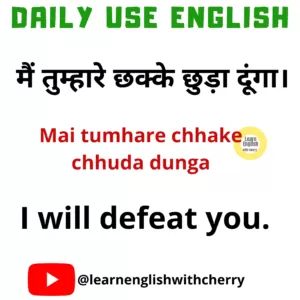
- Why did you go back on your words?
- व्हाय डिड यू गो बैक आॅन यूअर वर्डज़
- तुम अपने वादे से क्यों मुकर गए ?
- (tum apne vade se kyun mukar gye?)
- Who called you here?
- हू काल्ड यू हिअर ?
- तुम्हें यहाँ किसने बुलाया था ?
- (tumhein yahan kisne bulaya tha?)
8. I did it against my will?
(maine yeh apni marji ke khilaf kiya.)
- He took my advice amiss.
- आइ डिड इट अगेंस्ट माय विल |
- मैनें यह अपनी मर्जी के खिलाफ किया।
- (usne meri salah ka galat matlab nikala)
You can also watch video on ‘ Daily use English Sentences ‘ on my YouTube channel ‘Learn English with cherry’.
- I got wind of this matter?
- आइ गाट विंड आफ दिस मैटर |
- मु़झे इस बात का पता लग गया।
- (mujhe is baat ka pata lag gya)
- She kicked of her servant.
- शी किक्ड आफ हर सरवैंट |
- उसने अपने नौकर को निकाल दिया।
- (usne apne naukar ko nikal diya)
As these daily use English sentences are in simple past tense which shows that you are talking about something that has already happened.
- You did a good job.
- यू डिड अ गुड जाॅब
- तुमने अच्छा काम किया।
- (tumne achha kam kiya)
- He was throttle to death.
- ही वाज़ थरोटल टू डैथ
- उसे गला घोट कर मारा गया।
- (use gala ghot kar mara gya)
- He was muffle to death.
- ही वाज़ मफल टू डैथ
- उसे मुंह में कपड़ा ठूंस के मारा गया।
- (use muhn mein kapda thoons ke mara gya)
- He was stabbed to death.
- ही वाज़ सटैब्ड टू डैथ
- उसे चाकू भोंक के मारा गया।
- (use chaku bhonk ke mara gya)
- He turned a deaf ear to my voice.
- ही टर्नड अ डैफ इअर टू माय वाॅयस
- उसने मेरी आवाज अनसुनी कर दी।
- (usne meri aawaz ansuni kar dee)
- He showed much patience.
- ही शाॅड मच पेशंस |
- उसने बहुत धैर्य दिखाया।
- (usne bahut dhairya dikhaya)
- I was annoyed still I kept quiet.
- आइ वाज़ अनाॅयड स्टिल आइ कैप्ट क्वाइट |
- मैं गुस्सा था फिर भी चुप रहा।
- (main gussa tha phir bhi chup raha)
- We got to know in time.
- वी गाॅट टू नाॅअ इन टाइम |
- हमें समय रहते पता चल गया।
- (hanmein samay rehte pata chal gya)
- I heard this through a friend of mine.
- आइ हर्ड दिस थ्रू अ फरैंड आफ माइन
- मैनें यह अपने दोस्त से सुना।
- (maine yeh apne dost se suna)
Recent Comments